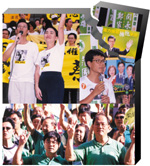 Online
Edition
Online
Edition | From
the editor Letters to the editor Milestone Answerman Periscope Campus Life Social Issues People Photo Features Education Channel Culture & Leisure Science |
| Last
Issue Archive |
| About
Varsity Advertise Media Links CUHK homepage JLM homepage |
Also
in Periscope
Defects
in the election system
![]()
Professionals call for serious planning
Laws regulating political parties vary across countries. However, Hong Kong does not have such laws. The recent Gary Cheng scandal has raised questions about the need for regulation. Some say party laws may pave the way for further development of political parties in local politics.
By Tramy Heung
At present, political groups are required to register as businesses operating under the Companies Ordinance, or as
organisations operating under the Societies Ordinance.
These ordinances were enacted to regulate businesses and organisations, but not political parties.
Under the Companies Ordinance, registered political parties are required to pay taxes when they receive donations.
Mr. Cheung Ying Tang, representative of the Democratic Party, said, “The donations are just regarded as the profits a company makes.
“The situation is anomalous. That’s why a set of party laws is essential in Hong Kong.?/font>
Mr. Albert Chan is a Legislative Council member in the Democratic Party.
He said, “The Companies Ordinance is inadequate for providing parties with a framework for their daily operations. Political parties are not business companies.?/font>
Whether a political party should declare its sources of revenue is the most controversial issue of all.
Most Western countries require parties to maintain records of their income and expenditures.
They also prohibit parties from affiliating with foreign interests or receiving donations, gifts and services from overseas.
Mr. Chan suggested that declaration of parties?revenues should be included when a political party law is drafted.
Otherwise it will be problematic if parties conceal their sources of revenue.
Said he: “On the surface, they are representing the public. In fact they may be just speaking for those who give them financial support.?/font>
But counter-arguements suggest that such declarations may scare off potential donors.
Ms. Margaret Ng is a barrister-at-law and legislative councillor.
She pointed out that it is not appropriate to require political parties to declare their revenue sources, since people have the freedom to support anyone and thus can give anyone donations.
However, Mr. Chan does not consider scaring away potential donors a problem. Instead, it should be the aim of party law to curtail undue influence of big donors.
Said he: “The party law should scare off anyone who wants to exert influence on the parties by giving them financial support.?/font>
However, party law may have trouble in gaining support from political parties due to various reasons.
According to Mr. Cheung, the government may regulate party activities by asking them to provide names of all members, but some parties might reject this as unnecessary and unreasonable.
Concerning the issue of whether the new law will regulate party activities, a spokesman for the Constitutional Affairs Bureau said the drafting of the law is still in a preliminary stage, so its exact content is unknown.
A legislative councilor, Mr. Leung Yiu Chung, said a party law should not only be enacted to regulate parties only, but also to regulate the whole election system.
He explained, “One of the aims in forming a political party is to participate in elections.
“If a party law can regulate party activities during the election period, it can benefit the development of the political system in Hong Kong.?/font>
Party law would be a sign of official recognition of political parties.
“The public will understand what political parties are actually doing and they will have more confidence in the parties,?said he.
However,
Mr. Leung said it might not be easy for the government to recognise local
political parties, since what the government wants is to reduce the influence
of parties rather than recognising their status. ![]()
 |
|
Ng
Siu Tung
 Margaret Ng and Albert Chan express their views on laws for political parties. |
 |